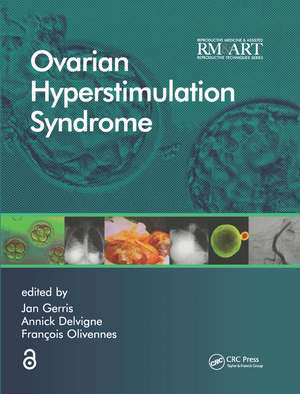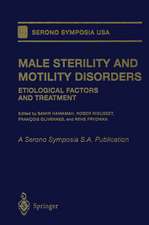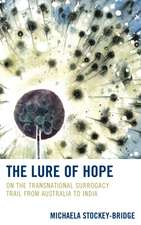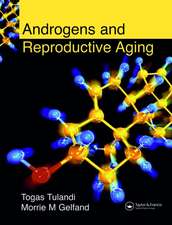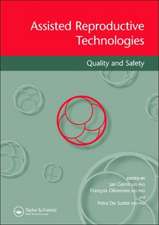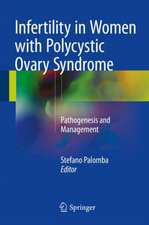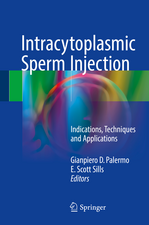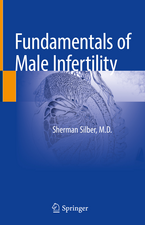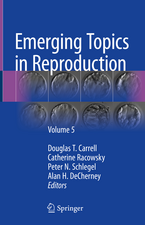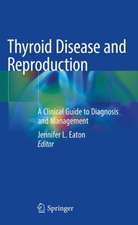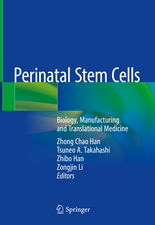Ovarian Hyperstimulation Syndrome: Reproductive Medicine and Assisted Reproductive Techniques Series
Editat de Jan Gerris, Annick Delvigne, Francois Olivennesen Limba Engleză Hardback – 4 mai 2006
Focusing on the clinically relevant aspects of the syndrome, Ovarian Hyperstimulation Syndrome is well-illustrated with appropriate diagrams showing biologic mechanisms, procedural algorithms, sonographs and radiological images. At the end of each chapter, frequently asked questions with appropriate answers help expand and elaborate difficult practice problems.
Preț: 331.24 lei
Preț vechi: 407.07 lei
-19% Nou
Puncte Express: 497
Preț estimativ în valută:
63.39€ • 68.83$ • 53.25£
63.39€ • 68.83$ • 53.25£
Carte tipărită la comandă
Livrare economică 22 aprilie-06 mai
Preluare comenzi: 021 569.72.76
Specificații
ISBN-13: 9781842143285
ISBN-10: 184214328X
Pagini: 320
Ilustrații: 42 b/w images and 31 tables
Dimensiuni: 189 x 246 x 25 mm
Greutate: 0.95 kg
Ediția:1
Editura: CRC Press
Colecția CRC Press
Seria Reproductive Medicine and Assisted Reproductive Techniques Series
Locul publicării:United Kingdom
ISBN-10: 184214328X
Pagini: 320
Ilustrații: 42 b/w images and 31 tables
Dimensiuni: 189 x 246 x 25 mm
Greutate: 0.95 kg
Ediția:1
Editura: CRC Press
Colecția CRC Press
Seria Reproductive Medicine and Assisted Reproductive Techniques Series
Locul publicării:United Kingdom
Public țintă
Professional ReferenceCuprins
Introduction – General Relevance of OHSS to the Safety and Quality of ART Section I: General and Clinical Aspects 1. General Definitions of OHSS 2. Epidemiology and Primary Risk-Factors of OHSS 3. Secondary Risk-Factors of OHSS during Stimulation 4. Clinical Manifestations of OHSS 5. Thrombo-Embolic Complications of OHSS 6. Anonymous Reports of Lethal Cases of OHSS 7. Modern Classification of OHSS 8. OHSS in Singleton and Twin Pregnancies Section II: Pathophysiology of OHSS 9. Physiopatology of OHSS 10. Role of the Vascular Endothelial Growth Factor (VEGF) in the Pathophysiology of OHSS 11. The Rennin-Angiotensin System in the Pathophysiology of OHSS 12. Immunological Aspects of OHSS 13. Genetic Aspects of OHSS 14. Potential New Treatment Implications Derived from Recent Molecular Developments in OHSS Section III: Management and Treatment 15. Treatment and Management of the Patients Presenting with OHSS 16. Management of OHSS from an American Perspective 17. Life-Threatening Forms of OHSS and the Intensive Care of the OHSS Patient 18. Outpatient Management of Patients with OHSS Section IV: Prevention 19. Primary Prevention: Choice Induction and of Ovarian Stimulation in IVF and Non-IVF Technologies 20. Does Ovulation Triggering Influence the Risk of OHSS? 21. Secondary Prevention of Threatening OHSS 22. The Role of Coasting in the Prevention of Threatening OHSS: An European Perspective 23. The Role of Coasting in the Prevention of Threatening OHSS: An American Perspective 24. Health Economic Reflections on OHSS and the Importance of Registries 25. Intravenous Hydroxyethyl Starch Infusion and Albumin Administration: Effective Tools as Adjuvants in the Prevention of OHSS 26. Ovarian Hyperstimulation Syndrome (OHSS) Summary and Guidelines
Notă biografică
Jan Gerris, Annick Delvigne and Francois Olivennes
Descriere
Major advances have recently been made in our understanding of Ovarian Hyperstimulation Syndrome (OHSS). These include improving classification, recognizing primary and secondary risk factors, manipulating and monitoring ovarian stimulation, handling risky situations, and elucidating the underlying pathophysiologic mechanisms of the syndrome. Focusing on the clinically relevant aspects of the syndrome, this text is well-illustrated with appropriate diagrams showing biologic mechanisms, procedural algorithms, sonographs and radiological images. At the end of each chapter, frequently asked questions with appropriate answers help expand and elaborate difficult practice problems.
